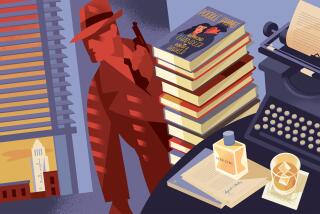CHARADE <i> by John Mortimer (Viking: $16.95; 188 pp.) </i>
- Share via
TO READ “CHARADE” is to read a young man’s novel, somewhat affected, with its pretensions showing through. It’s a bit disconcerting to realize the “young man” must be in his 60s--John Mortimer, entertaining writer of the Rumpole stories, “Paradise Postponed,” and many other books and plays. This, his first novel, was originally published in Britain in 1947.
In the story, the narrator--coyly left nameless--as a young man is hired as a director’s assistant for a film company making a semi-documentary movie about army maneuvers off the coast of Dover on the eve of the Normandy Invasion. (Mortimer worked for the Crown Film Unit during World War II.) Here, he learns quite a bit about the intrigues and power struggles involved in the business and meets a number of odd and mysterious characters, mostly from farce, who mainly sit around card tables and in bars, engaging in light banter.
Sometimes this gets really theatrical, and a character will launch into the story of his or her life, in a kind of comic aria where artiness flirts with cuteness--as when the director’s wife describes their first meeting when he chased her around her father’s estate, and her narrative becomes the story of Beatrix Potter’s “Peter Rabbit.”
Sometimes there is some amusing talk about the movie biz--though not enough for my tastes. Unfortunately, it doesn’t stop raining long enough to do much serious shooting, and one of Mortimer’s targets seems to be the ignorance of the people in the industry, including his own protagonist, the narrator. Thus, at the beginning of the novel, our hero, supposedly a devoted fan of cinema journals, doesn’t know what the term extras means; and even toward the end of the story, when he is about to be offered the coveted job of first assistant, over a number of older and more experienced assistants, he still has to have the term “rough-cut” explained to him. OK, I get Mortimer’s point: You don’t have to know anything about making movies to rise in the ranks of the industry. But is this any way to treat one’s protagonist?
Mortimer also curses the narrator with having to speak in a highly and ironically literary fashion, a la Conan Doyle: “I was present at that extraordinary, ghastly occurrence which was the chief incident of my film career and forms, as it were, the pivot of my story.” This incident--the perhaps accidental death of a soldier-actor during filming, perhaps caused by the film company--marks a turning point in the novel. Our hero is the only one capable of sustained concern about the matter; the irony surrounding him seems to disappear, and we are invited to take him seriously.
This isn’t much help to our poor hero, though, who, not surprisingly, is less sympathetic when he is acting self-righteous and morally superior than when he is behaving like an eager, but bumbling pipsqueak. Mortimer seems to have fallen into the young man’s temptation of having to make his first work a “serious statement” and, therefore, needing to identify with his protagonist.
It would be easier to indulge this if the author were still a young man and not actually a successful and established author. I suppose, if you can ignore this, you can see and enjoy a beginning writer’s cutting his teeth on social comedy, mystery, and, perhaps, though some of these scenes of eccentric babblers are the most dismayingly affected of all, theater. Thus, the John Mortimer fans among us have much here to muse about.
I’m also prepared to listen to the argument that Mortimer knows how some of these speeches sound in the mouths of these characters, even that of the narrator: absurd. But I suspect he considers them absurd/ironic rather than absurd/silly, and nothing is more dependent on time and culture than what is considered ironic.
When, at 13, I first tackled Jane Austen, I remember going to my mother and saying: “I can’t read this; it’s so silly,” and her saying: “It’s not silly, it’s ironic.” I went back to “Pride and Prejudice,” saying to myself: “It’s not silly, it’s ironic,” and managed pretty well to enjoy it. Several times, while reading “Charade,” I tried chanting the same spell but found myself answering back: “It’s not ironic, it’s silly.”
More to Read
Only good movies
Get the Indie Focus newsletter, Mark Olsen's weekly guide to the world of cinema.
You may occasionally receive promotional content from the Los Angeles Times.









